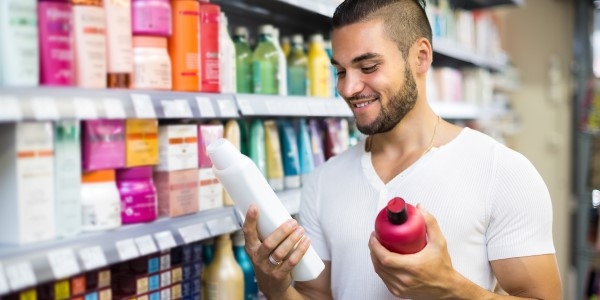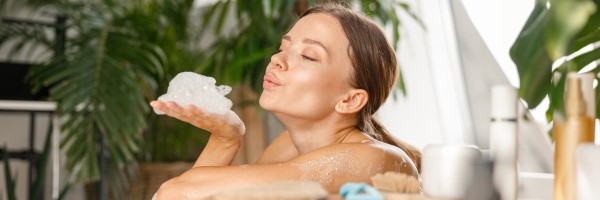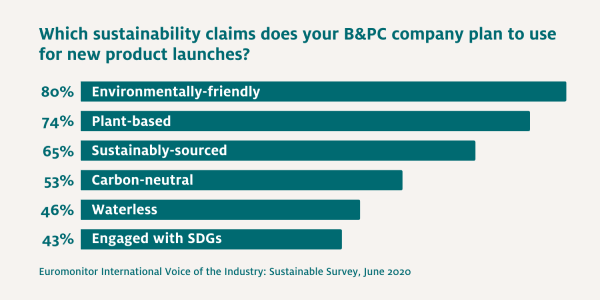Promotional Features
Sustainability efforts find new life in plant-based personal care
The global pandemic changed many consumer attitudes towards wellness, sustainability and their own personal care habits. Consumers had an abundance of time to reassess their personal care routines, and its ecological footprint. Over 79% of consumers globally read ingredient lists on skin care products.[1] And 38% are willing to spend more on products they consider to be sustainable, environmentally friendly or ethically sourced and manufactured. When the consumption of sustainable goods is motivated by personal benefits, consumers mirror those choices in their lifestyle and examine the impacts on their environment, their community and themselves.
Sustainability is so much more than environmental responsibility
With the global skin care market expected to grow to $203 billion by 2025[2], it’s no surprise brands are looking deeper into topics such as fair trade, human rights and biotech sourcing, in addition to creating value for local communities. Sustainability inspires innovative products such as solid shampoo and conditioner bars, waterless cleansers and skin care products, or refilling stations to reduce packaging waste.
Employing sustainable practices across the whole production cycle is now expected, from ingredients sourcing to manufacturing, positively impacting local communities offering sustainable packaging alternatives, ways of application and transportation. “We have to go further than clean labels and greenwashing to create products that resonate with today’s consumers, who are more knowledgeable and engaged in discussions about their environmental impact than ever before” says Chi Anigbogu, Global Marketing Manager from Ingredion Beauty & Home.
“Clean label” products under scrutiny by consumers seeking transparency
The clean beauty submarket has risen from niche to necessity, from cult status to critically acclaimed. Countless brands promote “clean label” products that appeal to their consumer base. However, there is no standard within the industry on “dirty” ingredients. Some brands list their own “no-no” lists, and mass retailers such as Ulta, Sephora, Target and Credo all released their own “clean beauty” indexes, redlining ingredient including parabens, sodium lauryl sulfate, talcum powder, aluminum powder, silicones and other ingredients they’ve deemed unsafe, either for consumers or for the environment.
Nowadays, “natural” is the most sought-after claim across the globe for personal care products, followed closely by efficacy.[3] However, decoding what natural means isn’t easy as it has no regulatory definition. Currently, the US bans only 11 ingredients[4], the EU over 1300[5]; that they’ve deemed unsafe or insufficient for personal care.
Is waterless beauty the answer?
Water is the most prolific ingredient in beauty and personal care products and is involved in every step in the product lifestyle. As water scarcity becomes a major global crisis, with the UN reporting that over 5 billion people could suffer water shortages by 2050, consumers are looking to decrease water consumption, and are turning to their favorite brands to offer water responsible solutions.[6]
While some companies set goals to decrease their water footprint, others are creating entirely waterless product lines. Ethique Beauty is a brand focused entirely on solid format shampoos, conditioners, moisturizers and more. Ingredion’s N-ZORBIT™ 2144 plating agent transforms liquids into powders for waterless formulations. Efficacy is a top priority for consumers, and brands can educate and promote the many benefits of waterless products to resonate with their customers.
The AgWater Challenge, led by Ceres and World Wildlife Fund (WWF), is engaging major companies with significant agricultural supply chains on water stewardship.[7] As part of the challenge, Ingredion is adopting regenerative farming practices on 500,000 acres of corn, tapioca, potato, pulses and stevia grown in high-risk watersheds by 2027, and across 1 million acres by 2030 — representing about 30% of its total global sourcing. It also will provide technical assistance and training to farmers and work with the Sustainable Agriculture Initiative Platform to develop a regenerative agriculture standard set for 2022.
Brands leading in beauty with eco-conscious goals
When asked which sustainability initiatives their company plans to invest in, over 70% of respondents listed eco-friendly product development, sustainable sourcing and water usage as top priorities[8]. Companies are investing in waterless product innovation, solid cosmetics, recyclable packaging, like Natura’s Ekos range, made from 100% recycled plastic.
The United Nations Sustainable Development Goals (SDGs) are featured in recent environmental targets set by multinationals such as L’Oréal and Proctor & Gamble. They are designed to be a “shared blueprint for peace and prosperity for people and the planet, now and into the future”[9]. Recently, Shiseido launched multiple sustainable skin care brands, featuring formulations of over 90% natural origin. Natura & Co’s sustainability vision 2030 includes initiatives to “defend human rights and be human-kind”. Their products often feature vegan or vegetarian ingredients, and locally-sourced materials.
Ingredion’s sustainability report adopts the SDGs into their 3-pillar “All Life” sustainability strategy. Their efforts resulted in reduced carbon emissions, using electricity from renewable resources, sustainably sourcing over 95% of the global waxy corn supply and implementing programs in 61% of the communities they operate in to eradicate child hunger. Ingredion was awarded the globally-recognized ECOVADIS sustainability silver rating for 2022.[10]
Supercharge products with plant-powered ingredients
Natural isn’t always synonymous with environmentally friendly, thus brands are increasingly looking at food waste as a beauty ingredient. PENCARE DP 1015 is an upcycled plant-based conditioning agent that solves the challenge of natural hair styling aids. Ingredion’s NATIVACARE line of organic and ECOCERT COSMOS certified ingredients provide viscosity and sensorial benefits in sustainable formulations.
Brian Nash, VP of Corporate Sustainability at Ingredion says companies are making commitments to science-based targets around carbon reductions, and other goals. “This is driving an increased focus on formulating products for sustainability. Having innovative ingredient solutions made from sustainable rice adds to our product portfolio and better enables customers to formulate in line with their own targets.”
It’s Ingredion’s objective to sustainably source all grains by 2030. In collaboration with the Sustainable Rice Platform (SRP), Ingredion is the first ingredient company to enter the sustainably grown waxy rice space. This impacts their communities and environments by reducing water usage, improving security and alleviating poverty.
Sustainability: where do we go from here?
Formulating sustainably is rewarding challenge as consumers value product transparency more than ever. Ingredion’s portfolio of plant-powered sustainably sourced ingredients helps brands reach their goals and earn consumer trust. Their TRUETRACE® program guarantees Non-GMO certified products with traceability from farm-to-face. Talc replacement is made easier with nature-based starches and biopolymers. Even with biodegradable ingredients, you can formulate sustainably and effectively and deliver on-trend products and solutions for today’s eco-conscious consumers.
Learn more about our plant-powered solutions:
-----
References:
[1] Ingredion Incorporated, Consumer Research for Beauty and Personal Care, 2018
[2] Euromonitor International Resrarch, Skin Care Markets
[3] Ingredion proprietary research, Consumer Research for Beauty and Personal Care, 2018
[4] https://www.ecfr.gov/current/title-21/part-700/subpart-b
[5] https://www.safecosmetics.org/get-the-facts/regulations/international-laws/
[6] https://www.theguardian.com/environment/2018/mar/19/water-shortages-could-affect-5bn-people-by-2050-un-report-warns
[7] https://www.ceres.org/water/agwater-challenge
[8] Euromonitor International Voice of the Industry: Sustainable Survey, June 2020.
[9] United Nations, 2030 Agenda for Sustainable Development, https://sdgs.un.org/goals
[10] Ingredion 2021 Sustainability Report, https://www.ingredion.com/content/dam/ingredion/pdf-downloads/corporate/INGR%202021%20Sustainability%20Report.pdf




